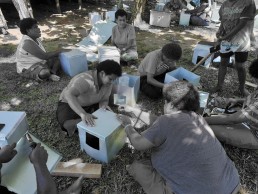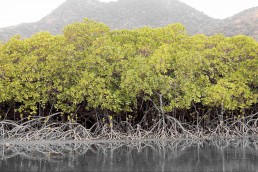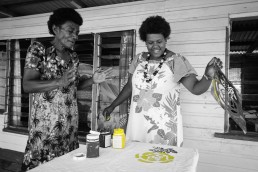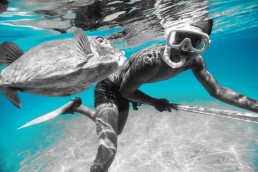Endangered Species
Our Ridge-to-Reef Approach to Restoration
Monitoring the return of sea turtles to Kia island.
The iconic yet increasingly rare Humphead or Napoleon Wrasse (Chelinus undulatus) and green and Hawksbill sea turtles—all endangered species in Fiji—are key flagship species for C3’s conservation campaigns. Both sea turtles, in particular, face overexploitation by communities: the former for the international fish trade, and the latter for traditional festivities.
C3 has engaged communities in outreach and monitoring programmes. As a result, we have successfully worked with traditional leaders to support the ten-year moratorium on sea turtle hunting, and to create a ban on the collection of the Humphead Wrasse. We continue to protect sea turtle nesting beaches and monitor Wrasse populations.
In 2017, sea turtles returned to Kia island for the first time in decades, laying their eggs under the protective eye of the community. These kinds of conservation successes deeply inspire our staff and communities. Moreover, with the right financial support, they can be upscaled and applied throughout the province, having immediate and sustained impact on endangered species populations.
Previous efforts by other non-profits for the community members include briefings on endangered species monitoring as well as cursory training as Fish Wardens. C3’s work on the ground, however, has revealed that despite publicity to the contrary, there are no such current activities due to lack of equipment, transport, and follow-up support. In some cases, endangered species were even incorrectly tagged, which led to maiming and potential death. While shocking, it reiterates the need for NGOs to take the necessary time and effort to work with communities on-site and long-term. Simply sending in teams for brief training and with no further contact can do more harm than good.
We work with the following agencies and organizations:
C3 gathers traditional ecological knowledge about fish and flagship marine species and integrates this into outreach and conservation campaigns. Furthermore, we use the Ridge to Reef approach to support the many endemic species on the islands. We achieve this through habitat restoration and enhancement, and population monitoring.
We have focused our restoration efforts on the Vunivia Catchment Area, which forms part of the largest intact watershed on Vanua Levu; this, in turn, connects with the high-value Cakua Levu reefs. The flora here is part of Fiji’s last major system of mesic forest, consisting of a mosaic of vegetation types: mesic sclerophyll forest, transition forest, stunted Dacrydium nidulum forest, mangrove forest, montane forest, brackish and freshwater wetlands, and disturbed landscapes. Once labeled wholly as “dry forest”, we have seen that it is much more diverse than previously indicated. The flora comprises more than 268 native species, several of which are rare or narrowly distributed.
C3 works with traditional landowners to restore and extend these ecosystems. High-impact logging threatens the water quality and fisheries habitats in this region; therefore, urgent action is needed. Communities need to protect their remaining forests if biodiversity and local livelihoods are to be sustained.
To further reduce the impact of local communities on coastal and upland forests, C3 has equipped 300 households across Macuata with the skills to assemble and use fuel-efficient stoves. With the training of women per village, pre- and post-training collection of baseline data, and monthly advising of trainees, this number is expected to increase to 400 in 2022.
We have also helped establish native tree nurseries and replanting programmes. C3’s current partnership with the European Union and the Ministry of Forestry will amplify our efforts to maintain native forest reserves. Our goals include increasing the replanted forest area from 4.5 ha in 2015, to 14.5 ha in 2023. Appropriate saplings are chosen for this purpose.
Community protection for the forests will similarly increase from 4.5 ha in 2019, to 15 ha in 2022. A team of twenty community rangers, at least half of which are women, will also be trained by 2022. Signage and infrastructure installation will accompany the declaration of forest reserves and the reforestation of key degraded sites.

Related Case Studies
Contact
C3 Fiji108 Nasekula Road, Labasa
C3 Fiji (Community Centred Conservation (Fiji) Limited), in accordance with the Companies Act, is registered as a non-profit organization in Fiji under the Registrar of Companies with Company Registration No. RCBS2014G3314.



